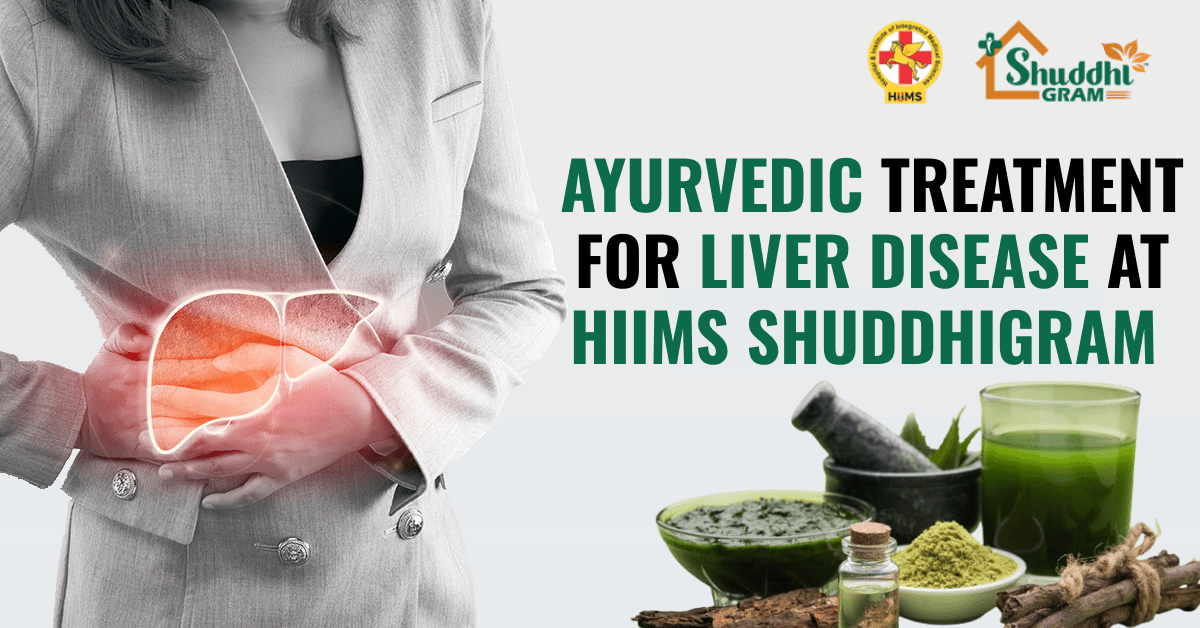
The liver plays an integral role in maintaining overall health. It supports essential functions such as digestion, metabolism, and detoxification. However, poor dietary choices, sedentary habits, alcohol intake, and stress can often lead to liver disorders like fatty liver, hepatitis, and cirrhosis.
While modern medicine focuses on symptomatic relief or chemical-based drugs, many people are now exploring alternative approaches. One such approach is Ayurveda, a time-tested system that offers natural methods to manage liver conditions. Ayurveda emphasizes harmony between body, mind, and nature and aims to support the body’s natural processes without the burden of synthetic compounds or adverse effects. Liver Disease Treatment at HiiMS Shuddhigram follows the same holistic principles, offering natural therapies to detoxify and restore liver health effectively.
Understanding Liver Disease Through Ayurveda
The majority of liver issues, according to Ayurvedic principles, are brought on by an imbalance in the Pitta dosha, which controls digestion and metabolism. When Pitta becomes aggravated, it may accumulate toxins (Ama), inflammation, and impaired liver function.
Ayurveda doesn’t view liver issues in isolation. It assesses the entire body constitution (Prakriti) and identifies the root imbalance before recommending any intervention. This holistic understanding forms the foundation of treatment at any good Ayurvedic hospital for liver disease.
Herbal Approach to Liver Disease Treatment
Herbs used in Ayurvedic medicine are well known for their ability to improve liver health. They are used in formulations such as powders, decoctions, and capsules and are carefully selected based on the individual’s body constitution and specific condition.
Some commonly used herbs include:
- Bhumi Amla (Phyllanthus niruri): Often used to assist in flushing out toxins and supporting liver cell renewal.
- Kutki (Picrorhiza kurroa): Traditionally used to manage bile secretion and digestive issues.
- Amla (Indian Gooseberry): It is well-known for its antioxidant qualities and may aid the liver’s defence against free radicals.
- Giloy (Tinospora cordifolia): This herb is often recommended to support immunity and assist in detoxification.
- Punarnava (Boerhavia diffusa): Valued in Ayurvedic texts for its properties in managing fluid retention and supporting overall liver activity.
These herbs are often prescribed in precise formulations under expert supervision at an Ayurvedic hospital for liver disease.
Role of Diet in Ayurvedic Liver Care
Food is considered a natural medicine in Ayurveda. A suitable diet is not just about preventing complications but also about creating a favorable internal environment for liver health.
Ayurvedic dietary guidelines include:
- Incorporating bitter foods like fenugreek, neem, and bitter gourd.
- Including fiber-rich fruits and vegetables such as beets, carrots, and papaya.
- Avoiding refined sugar, fried food, processed items, and heavy dairy.
- Drinking warm water and herbal infusions like ginger or cumin tea to support digestion.
- Adding healthy fats from natural sources such as flaxseeds, coconut, and nuts.
A consistent dietary routine helps the digestive system work efficiently and prevents the buildup of toxins.
Panchakarma Therapies in Liver Disease Treatment
Panchakarma, the detoxification protocol in Ayurveda, is often a part of liver disease treatment. These therapies are designed to eliminate deep-seated toxins and support internal balance.
Some relevant therapies include:
- Virechana (therapeutic purgation): Often recommended to cleanse the intestines and liver through medicated substances.
- Basti (medicated enema): This method aims to regulate digestion and flush out toxins through herbal decoctions.
- Abhyanga (oil massage): A calming technique that may support circulation and help relieve discomfort.
These therapies are usually offered in specialized Ayurvedic hospitals for liver disease, under close observation by experienced practitioners.
Lifestyle Adjustments for Liver Health
In Ayurveda, a healthy lifestyle is as important as medicine. To support liver health, certain habits are encouraged:
- Regular physical activity: Yoga asanas such as Bhujangasana (cobra pose) and Dhanurasana (bow pose) can help stimulate abdominal organs.
- Stress management: Meditation and breathing techniques like Kapalabhati and Anulom Vilom are useful to keep the mind and body in balance.
- Following Dinacharya (daily routine): Eating meals at regular times, sleeping early, and waking up with the sun are considered essential lifestyle practices.
These daily patterns assist the body’s natural detoxification cycle and maintain digestive rhythm, which indirectly contributes to liver well-being.
Integrative Approach at Ayurvedic Hospitals
When seeking Ayurveda treatment for liver disease, speaking with professionals at a reputable Ayurvedic hospital is critical. These hospitals offer individualised treatment programs incorporating Panchakarma therapies, dietary counselling, herbal remedies, and lifestyle coaching.
Institutions such as HiiMS (Hospital & Institute of Integrated Medical Sciences) use an integrative approach, providing consultations, Ayurvedic diagnosis, and treatment regimens adapted to individual needs.
Conclusion
Ayurveda provides a systematic but natural approach to managing liver disorders that avoids the use of chemicals. Herbs, diet, and detox therapy are used to restore internal balance rather than only treat symptoms.
For individuals exploring sustainable liver disease treatment options, Ayurveda can be a valuable path. The goal is to support the body’s capacity to function optimally and guide it toward self-repair using time-honored practices.
Choosing the right is an important step. A proper diagnosis and supervised care plan can help create a meaningful difference in liver health over time.







No approved comments yet.